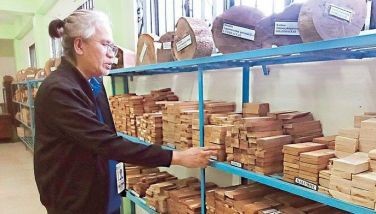US institute asks donor agencies to speed up aid to Mindanao
April 3, 2006 | 12:00am
SUBIC BAY, Zambales — The United States Institute for Peace (USIP) expressed optimism yesterday that a peace agreement will be signed between the government and the Moro Islamic Liberation Front (MILF) this year and called on foreign donor agencies to advance aid to the region.
However, Eugene Martin, USIP executive director of Philippine Facilitation Project, cautioned both sides not to rush into a peace agreement just to meet the "deadline" this year as the negotiations have entered the complicated phase on ancestral domain.
He said frontloading of development aid in Mindanao would greatly help in ensuring the success of the peace agreement.
"We recommend that these agencies advance their aid, it’s like sowing the seeds for peace and this would encourage everyone... it’s like an incentive that would show that the peace process would work," he said in an interview.
Martin issued the statement after President Arroyo appealed last week to the international donor community to provide aid to Mindanao as she expected to have a peace agreement signed with the MILF by the end of the year.
Mrs. Arroyo pointed out that other countries have done so under the Mindanao Trust Fund set up by the World Bank.
The USIP, established in 1984 by the US Congress as a non-partisan and independent organization, has been helping in efforts to prevent or resolve conflicts in many countries, including the Philippines, and resolve post-conflict problems, including promoting development and reestablishing the rule of law while promoting understanding through media and religious groups.
Martin said the US Agency for International Development (USAID) has long begun pouring in development funds in areas previously affected by decades-long fighting between government forces and the MILF.
The initial USAID funding for capacity building, education and other development projects of $30 million is being released, he added.
Martin said lessons should be learned from the 1996 peace agreement with the Moro National Liberation Front where work to secure funding only began when the pact was forged.
"The peace agreement is just a first step in resolving conflict, the most difficult phase comes after it when people would have to change, and empowering them to enable them to take charge of their future would help," he said.
The former rebels and their communities did not receive any "peace dividends" so the agreement did not have the support it badly needed, he added.
The USIP has been involved in conflict resolution in Mindanao since both sides sought the help of the US during the early part of the Arroyo administration, Martin said.
The University of Georgia’s James M. Cox Jr. Center for International Mass Communication Training and Research, through a grant from USIP, held a three-day seminar here for foreign, Manila and Mindanao-based journalists as well as experts and academicians on conflict-reporting and its effect on the peace process.
Meanwhile, Canadian Ambassador Peter Sutherland assured that Canada remains a committed development partner of the Philippines, particularly on the Mindanao front, through the Canadian International Development Agency (CIDA).
"Mindanao is a major focus for CIDA’s significant program in the Philippines," he said in a statement.
"Our emphasis on governance, support to small business and conflict-affected areas reflect the importance we attach to these integral components of the government’s strategy for peace and development in Mindanao.
The embassy said Canada also provides funding to community-based projects for sustainable development through the Canada Fund for Local Initiatives.
"Canada appreciates the continued use of the more inclusive and interactive format which has enhanced the dialogue on key policy issues," the embassy said.
"The participatory and broad-based composition of the forum is expected to contribute to increased transparency and accountability of decision-making."
With its contribution of P34 million, Canada was one of the largest donors to the first phase of the Mindanao Trust Fund when it was launched in Cotabato City last week.
The trust fund will focus on institutional strengthening of local government units, people’s organizations, and local service providers as well as reconstruction and development sub-projects in conflict-affected communities in Mindanao, particularly in the Autonomous Region in Muslim Mindanao (ARMM).
Aside from its contribution to the Mindanao Trust Fund, Canada is also providing assistance to Mindanao through the following:
• Its capacity-building initiatives under its Local Governance Support Program in the ARMM (LGSPA);
• Its Justice Reform Initiatives Support Project (JURIS) which assist the Supreme Court’s reform plans including strengthening of the Shari’a judicial system;
• Advocating peace and the peace-building process through efforts of local civil society under its Building Unity and Integrating Local Efforts towards Democratic Development Project (BUILD); and helping local small to medium enterprises through
• Its Private Enterprise Accelerated Resources Linkages Project (PEARL2) and the Promoting Rural Industries and Market Enhancement (PRIME) Program.
Canada sent an active delegation to the Philippines Development Forum led by CIDA Director-General for Southeast Asia Pauline Kehoe together with Tom Carroll, the Head of CIDA in the Philippines. –Paolo Romero
However, Eugene Martin, USIP executive director of Philippine Facilitation Project, cautioned both sides not to rush into a peace agreement just to meet the "deadline" this year as the negotiations have entered the complicated phase on ancestral domain.
He said frontloading of development aid in Mindanao would greatly help in ensuring the success of the peace agreement.
"We recommend that these agencies advance their aid, it’s like sowing the seeds for peace and this would encourage everyone... it’s like an incentive that would show that the peace process would work," he said in an interview.
Martin issued the statement after President Arroyo appealed last week to the international donor community to provide aid to Mindanao as she expected to have a peace agreement signed with the MILF by the end of the year.
Mrs. Arroyo pointed out that other countries have done so under the Mindanao Trust Fund set up by the World Bank.
The USIP, established in 1984 by the US Congress as a non-partisan and independent organization, has been helping in efforts to prevent or resolve conflicts in many countries, including the Philippines, and resolve post-conflict problems, including promoting development and reestablishing the rule of law while promoting understanding through media and religious groups.
Martin said the US Agency for International Development (USAID) has long begun pouring in development funds in areas previously affected by decades-long fighting between government forces and the MILF.
The initial USAID funding for capacity building, education and other development projects of $30 million is being released, he added.
Martin said lessons should be learned from the 1996 peace agreement with the Moro National Liberation Front where work to secure funding only began when the pact was forged.
"The peace agreement is just a first step in resolving conflict, the most difficult phase comes after it when people would have to change, and empowering them to enable them to take charge of their future would help," he said.
The former rebels and their communities did not receive any "peace dividends" so the agreement did not have the support it badly needed, he added.
The USIP has been involved in conflict resolution in Mindanao since both sides sought the help of the US during the early part of the Arroyo administration, Martin said.
The University of Georgia’s James M. Cox Jr. Center for International Mass Communication Training and Research, through a grant from USIP, held a three-day seminar here for foreign, Manila and Mindanao-based journalists as well as experts and academicians on conflict-reporting and its effect on the peace process.
Meanwhile, Canadian Ambassador Peter Sutherland assured that Canada remains a committed development partner of the Philippines, particularly on the Mindanao front, through the Canadian International Development Agency (CIDA).
"Mindanao is a major focus for CIDA’s significant program in the Philippines," he said in a statement.
"Our emphasis on governance, support to small business and conflict-affected areas reflect the importance we attach to these integral components of the government’s strategy for peace and development in Mindanao.
The embassy said Canada also provides funding to community-based projects for sustainable development through the Canada Fund for Local Initiatives.
"Canada appreciates the continued use of the more inclusive and interactive format which has enhanced the dialogue on key policy issues," the embassy said.
"The participatory and broad-based composition of the forum is expected to contribute to increased transparency and accountability of decision-making."
With its contribution of P34 million, Canada was one of the largest donors to the first phase of the Mindanao Trust Fund when it was launched in Cotabato City last week.
The trust fund will focus on institutional strengthening of local government units, people’s organizations, and local service providers as well as reconstruction and development sub-projects in conflict-affected communities in Mindanao, particularly in the Autonomous Region in Muslim Mindanao (ARMM).
Aside from its contribution to the Mindanao Trust Fund, Canada is also providing assistance to Mindanao through the following:
• Its capacity-building initiatives under its Local Governance Support Program in the ARMM (LGSPA);
• Its Justice Reform Initiatives Support Project (JURIS) which assist the Supreme Court’s reform plans including strengthening of the Shari’a judicial system;
• Advocating peace and the peace-building process through efforts of local civil society under its Building Unity and Integrating Local Efforts towards Democratic Development Project (BUILD); and helping local small to medium enterprises through
• Its Private Enterprise Accelerated Resources Linkages Project (PEARL2) and the Promoting Rural Industries and Market Enhancement (PRIME) Program.
Canada sent an active delegation to the Philippines Development Forum led by CIDA Director-General for Southeast Asia Pauline Kehoe together with Tom Carroll, the Head of CIDA in the Philippines. –Paolo Romero
BrandSpace Articles
<
>
- Latest
- Trending
Trending
Latest
Trending
Latest
Recommended






























